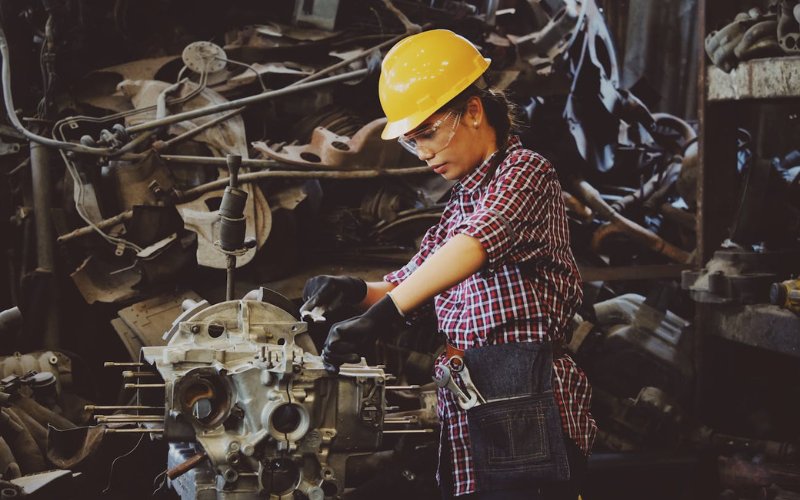Computerized Numerical Control turning is a precise and versatile machining process that creates intricate parts by rotating a workpiece against a cutting tool. This technology has revolutionized manufacturing sectors, such as automotive, aerospace, and medical devices, by delivering components with exceptional precision and efficiency.
CNC Turning also allows for the automation of production lines, enhancing the ability to produce complex parts with minimal supervision and greater resource efficiency, thereby reducing operational costs and increasing productivity. This machining method’s capabilities extend far beyond traditional approaches, significantly improving speed, accuracy, and repeatability.
The Technology Behind Precision Machining
These machines operate on programmed instructions that control the movement of cutting tools and workpieces, ensuring that each cut is made precisely. Integrating advanced software with state-of-the-art mechanical components allows for the automation of complex processes, reducing the potential for human error and enhancing the overall quality of the final product. Modern CNC machines also have sensors and feedback systems that monitor and adjust real-time operations. This adaptive capability ensures optimal performance even with variations in material properties or environmental conditions, further solidifying their role in precision manufacturing.
Enhanced Precision and Consistency
One of the standout features is its ability to produce parts with extremely tight tolerances. Advanced machines can maintain accuracy within a few micrometers, which is crucial for applications requiring high levels of precision, such as in the aerospace and medical sectors. This consistency is paramount when producing large volumes of parts, ensuring that each component is virtually identical to the next.
Advantages Of Conventional Machining
Speed and Efficiency
These machines are significantly faster than manual lathes. Their automated nature means they can operate continuously without breaks, speeding up production times and increasing output. Modern machines’ ability to perform multiple operations simultaneously, such as cutting, drilling, and finishing, further enhances efficiency, reducing the need for various setups and handling.
Flexibility in Production
The programmable nature allows quick setup changes between jobs, making it ideal for high-volume production and small custom projects. Manufacturers can switch between different designs with minimal downtime, allowing for greater flexibility in production scheduling and the ability to respond quickly to market demands or customer specifications.
Impact on Material Waste Reduction
This method is not only efficient but also environmentally friendly. The precision of machining minimizes material waste, as components are produced to exact specifications with less scrap and fewer offcuts. This efficient use of materials reduces costs and aligns with sustainable practices by diminishing the environmental impact of manufacturing.
Cost-Effectiveness
While the initial investment in equipment may be high, the long-term savings are significant. Reduced labor costs, lower waste production, and the ability to produce higher-quality products more quickly and efficiently translate into a quicker return on investment. It makes it a cost-effective solution for many industries, particularly those requiring high-precision complex parts.
Precision Machining in Various Industries
Automotive Industry
This process is crucial for producing durable, reliable components that meet strict industry standards in the automotive sector. Parts such as engine components, pins, bushings, and connectors are manufactured with precision to ensure vehicles’ optimal performance.
Aerospace and Defense
The aerospace industry benefits immensely from the advanced capabilities of precision machining. Components for aircraft and spacecraft must adhere to the highest precision standards due to the critical nature of their function. It facilitates the production of these complex parts with the necessary precision and reliability. Precision aerospace machining is crucial for achieving the lightweight yet strong components required for aerospace applications, ensuring safety, enhancing performance, and reducing fuel consumption.
Medical Device Manufacturing
The process plays a vital role in the medical field by producing bespoke components for medical devices. Surgical tools, implants, and orthopedic devices require exact specifications that can reliably ensure the safety and effectiveness of medical treatments. An example of machinery which is often used to produce medical devices is hyperboloid connectors.
Due to their reliable and efficient electrical connections, they ensure smooth functionality in critical environments. Precision machining ensures these components meet stringent regulatory standards and function flawlessly in critical applications, enhancing patient outcomes and supporting innovative medical technologies.
The Future of Precision Machining
This process is poised to integrate more deeply with digital manufacturing technologies such as 3D printing and AI-driven predictive maintenance. These integrations promise even greater efficiencies and capabilities, including enhanced predictive analytics for machine maintenance and improved design for manufacturability. As technology advances, this method will continue to play a crucial role in driving innovation and efficiency in manufacturing.
CNC turning represents a pinnacle in the evolution of machining processes, offering unmatched precision, efficiency, and flexibility. Its impact on various industries cannot be overstated, as it continues to push the boundaries of what is possible in manufacturing. The advanced capabilities ensure superior product quality and contribute to more sustainable manufacturing practices.




